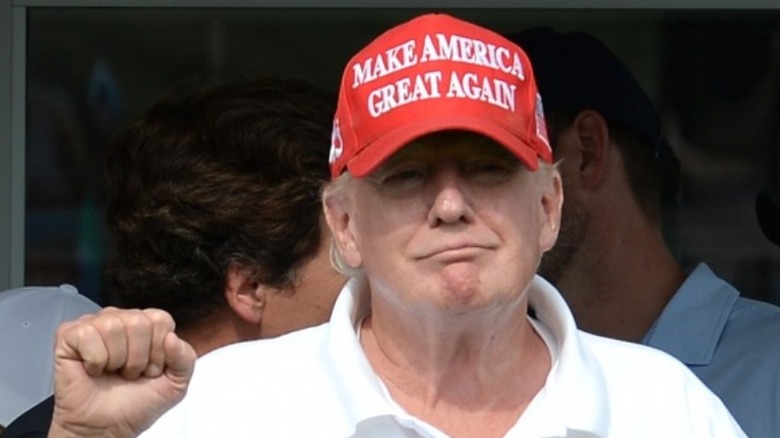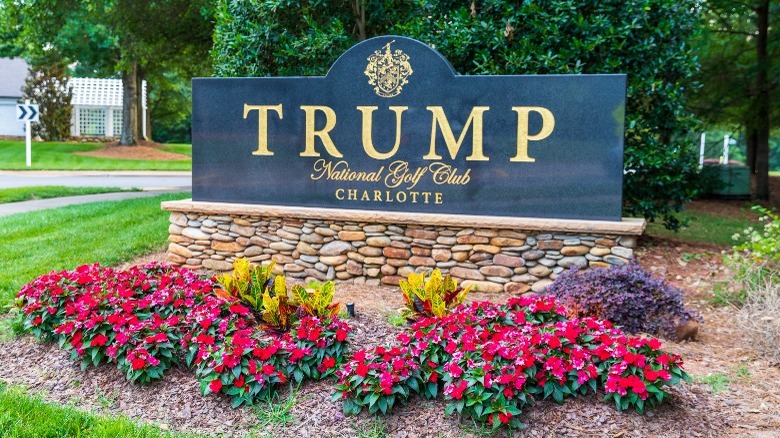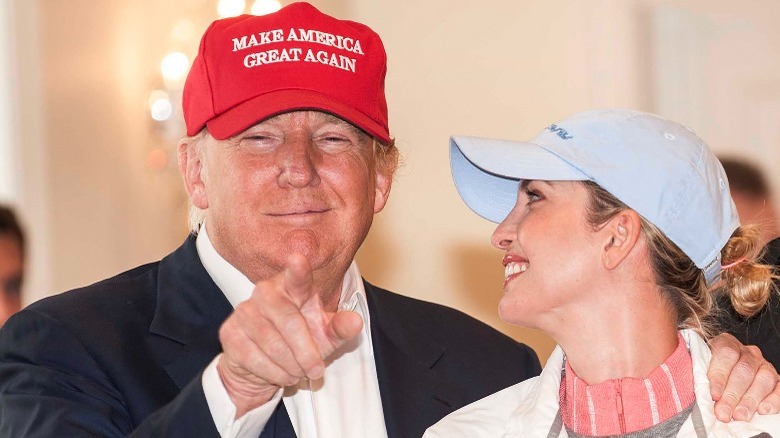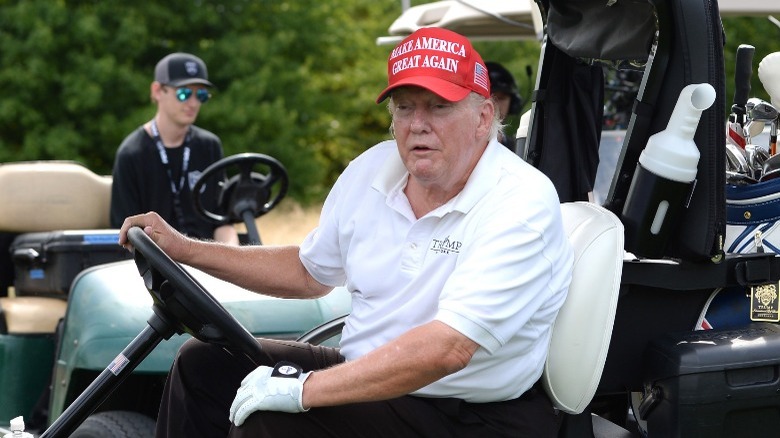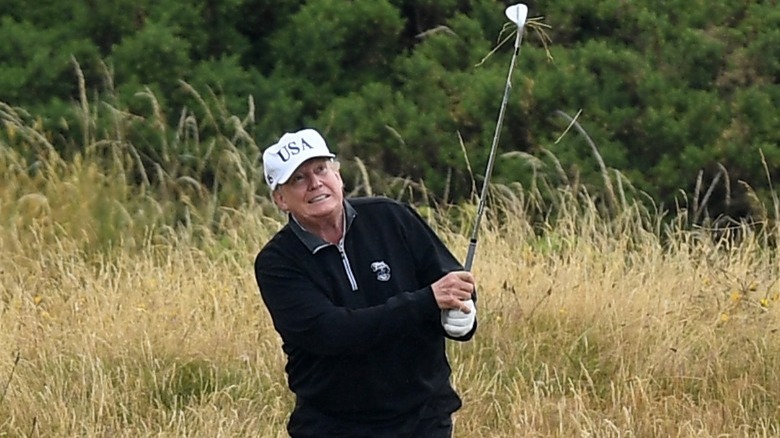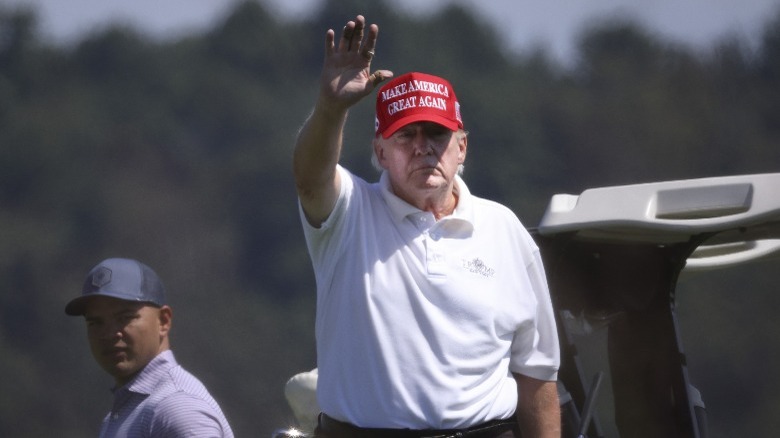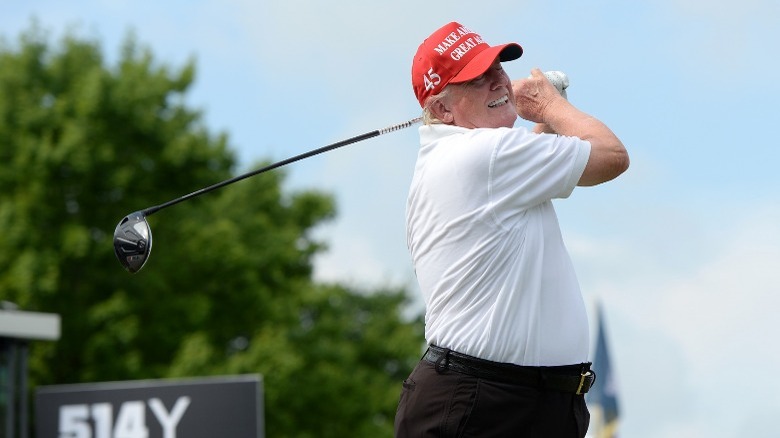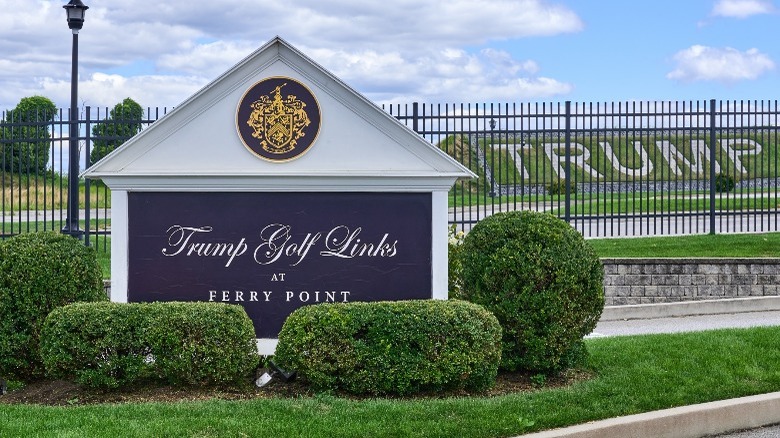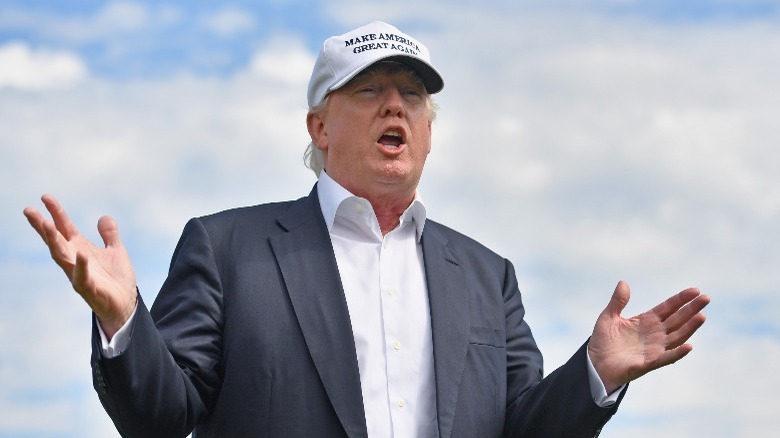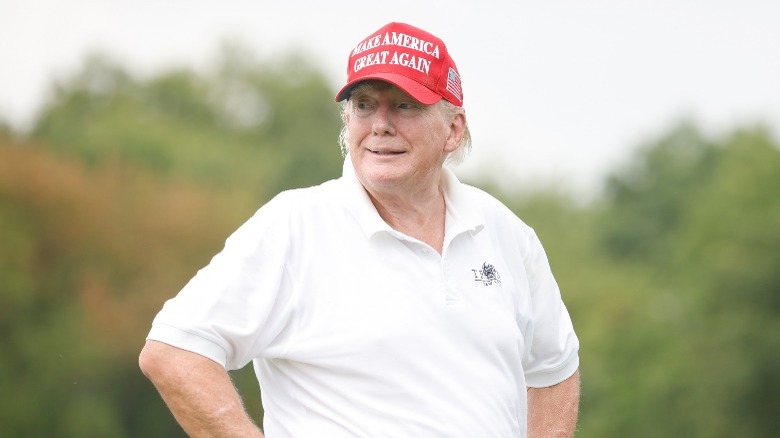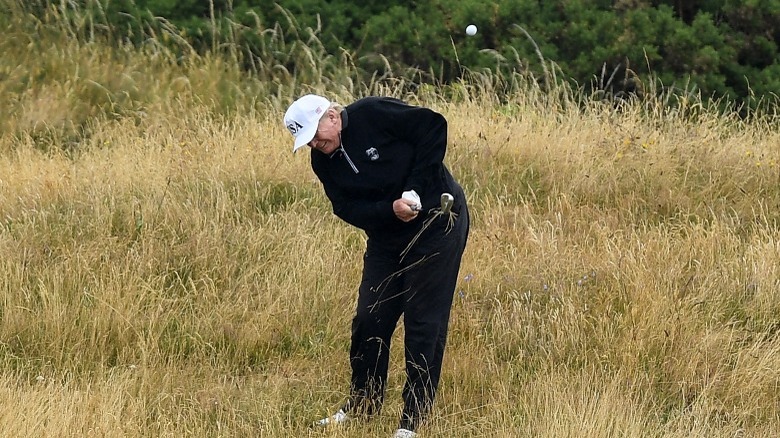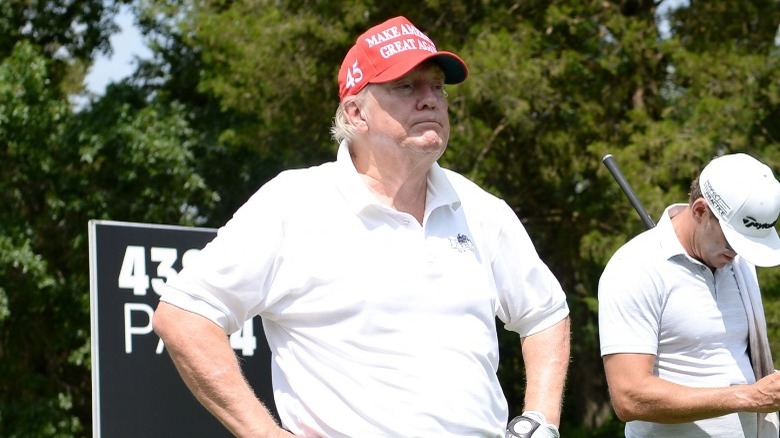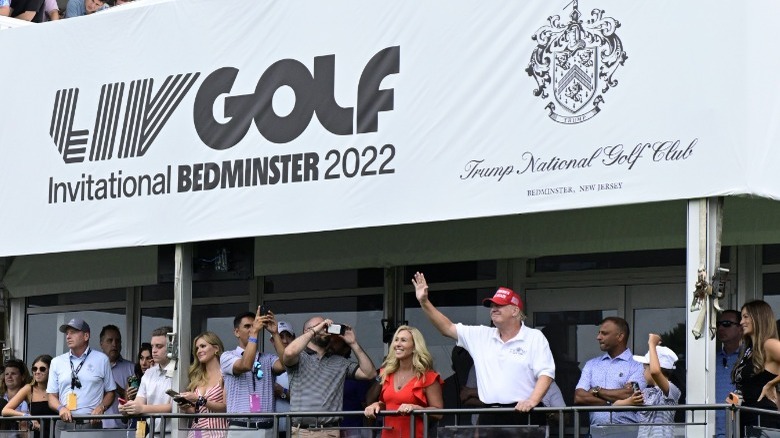The Reality Of Donald Trump's Golf Empire
Long before Donald Trump was the 45th President of the United States of America, he was a very well known and highly influential figure in the golf world. According to his website, Trump Golf, the Trump Organization made their first golf course acquisition in 1999, when they acquired what would become the Trump International Golf at West Palm Beach. In 2011, Trump developed the organization's first international golf course, when he created the Trump International Golf Course at the Great Sand Dunes in Aberdeen, Scotland.
His most recently completed course was Trump International in Dubai, which opened in 2017. In the coming years, Trump's website claims there will be two more international courses opening in Indonesia — in Bali and Lido — in addition to another course in Dubai. However, not all of Trump's golf course ventures have worked out. Per Time, in 1998, he spent around $2.5 million on over 400 acres of land in upstate New York, only for the local governments to deny his plans citing environmental concerns.
Trump still frequently plays golf now that he is no longer in the White House, and he is very popular on his home courses among friends and fans (per The New York Times). This is the reality of Donald Trump's golf empire explained.
Trump has 16 open golf courses
Being such a large presence in the golf world, you would expect Donald Trump to have at least a few properties. Still, finding out the Trump Organization has a whopping 16 open courses is pretty surprising. Since acquiring Trump International Golf Club at West Palm Beach in South Florida, he has opened another 15 golf clubs, and he has plans to open as many as three more in the coming years (per Trump Golf). Of the courses, seven of them are open to the public, while nine of them are private clubs for members only (via Trump Golf).
His courses boast some very famous architects and designers, and several of them were designed by the Fazio design family. Jim created the course at West Palm Beach, and Tom and his son Tom II are responsible for the Bedminster, Colts Neck, Washington, D.C., and Philadelphia courses. Tiger Woods designed Trump's golf course for the still-under-construction Trump World Golf Club in Dubai in the United Arab Emirates. Ernie Els, the South African golfer better known as "The Big Easy," designed another of Trump's future courses in Lido, Indonesia.
Many of the courses have also hosted major PGA and LPGA events, including the 2017 Women's Open and the 2017 Senior PGA Championship. His course in Doral, Florida, has hosted more than 50 PGA tour events alone, though not all of them under Trump's ownership.
Trump used his presidency to help his golf courses
When Donald Trump became president in 2017, there were a lot of questions about what would happen with his business interests, and especially his golf courses. As the Citizens for Responsibility and Ethics in Washington (CREW) watchdog group points out in their 2020 report, even though Trump surmised that he would be too busy to golf as president, he had actually visited his own properties 303 times by September 2020. Trump also had public officials, both domestic and foreign, visit his Virginia, Bedminster, and West Palm Beach golf clubs more than 400 times during his presidency.
In 2020, The New York Times reported that Trump tried to get the U.S. Ambassador to Britain, Robert Wood Johnson IV, to pressure British officials to host the British Open at his Scotland golf club in Turnberry. In 2017, The New York Times also reported that his course in Bedminster, New Jersey, was using the possibility of Trump's in-person appearance to market the venue for weddings. The newspaper pointed out the use of his name and presidency for financial gain are violations of the presidential emoluments clause.
Trump used appearances at Bedminster to drum up publicity in 2020 (via The Washington Post), when he held a press conference and signed four separate executive orders in his clubhouse. It's unclear exactly how much Trump financially gained at his golf courses through his presidency, but according to CREW, it was significant.
The hole-in-one controversy
Usually, getting a hole-in-one when playing golf is an incredibly special event that becomes a cherished memory. That is, unless you are Martin Greenberg. In 2010, Greenberg was participating in a charity golf event being hosted at Trump National Golf Club in Westchester, New York, when he hit a hole-in-one on the 13th hole (via NPR). Importantly, the 13th hole was extra special during this tournament, because it was designated as a "million dollar shootout," where certain high profile donors who hit a hole-in-one on the 13th would win a cool million dollar prize.
However, trouble soon began over collecting the money. Part of the rules for the shootout were that the tee had to be at least 150 yards away from the hole. Originally, when Greenberg showed the tournament officials where he had hit his ball from, it appeared to be 150 yards. However, when the officials viewed the actual video of the attempt, they determined his tee was actually set to 139 yards -– 11 yards short. To make things even trickier, somebody had changed the markers that measured how far away the tee was from the hole — after Greenberg had taken his shot but before officials had measured them.
When the insurance company refused to pay Greenberg his winnings on the basis of his tee's position, he immediately sued them and the Trump Organization. Eventually, according to the Washington Post, the Trump Foundation settled with Greenberg for $158,000, which was given to his charity organization.
Several of Trump's golf courses have had environmental issues
Many of Donald Trump's golf courses have fun afoul of environmentalists, both within the United States and internationally. In 2015, the Washington Post reported that environmentalists in Virginia were upset over his Washington, D.C., golf club. In order to increase the course's size, Trump had nearly 500 trees cut down to make space. The trees included black locusts, green ashes, and American elms, and it wasn't cheap to cut them down. Trump spent more than $1 million to remove them, because he claimed they were actually causing environmental problems themselves.
In 2019, Trump once again ran into issues with trees at Trump National Golf Course in Virginia, when the course was cited for illegally clearing 31,000 square feet of trees (per ABC). In 2017, environmentalists in Indonesia expressed concern over his planned courses in Lido and Bali (via Mongabay). They argued the area Trump wanted to build one of his courses was too close to the Tanah Lot Temple, a holy shrine and ancient Hindu temple, and that it would negatively impact farmland in the area.
Trump also ran into issues with his course in Aberdeen, Scotland. According to The Guardian, some of the famous sand dunes in the area had been decimated by construction on Trump's golf course. The dunes were a "site of special scientific interest," and environmentalists were outraged over the destruction.
Some of Trump's courses are deeply unprofitable
When you have a business empire as large as Donald Trump's, it's expected there's going to be a couple of unprofitable investments. Still, seeing some of the losses his golf courses have put up over the last two decades is staggering. As Slate reported in 2020, Trump's courses had lost more than $315 million since 2000. In one egregious example, after purchasing Trump National Doral for $150 million, he proceeded to lose another $162 million between 2012 and 2018.
According to Forbes, Trump's course in Scotland at Turnberry has had massive losses, totaling $68 million from 2014 to 2021. This is in addition to the $65 million purchase price and reported $80 million in improvements, putting him more than $200 million in the hole from Turnberry alone. His Doonbeg, Ireland, course has lost more than $18 million in a similar time frame, and his Aberdeen, Scotland, course is only slightly better at $17 million in losses from 2012 to 2020.
Much of the loss in value has come from depreciation, and COVID-19 caused a huge drop in sales and profits. As Mother Jones reported, Trump's Doonbeg resort lost $4 million in 2020 alone, and saw a more than 50% drop in revenue from 2019. Mother Jones also claimed that more than 75% of the Trump Organization's revenue came from resorts that included golf courses, making the financial slide even more serious.
The controversial farmland tax break for Bedminster
Among the staples at Donald Trump's National Golf Course in Bedminster, New Jersey, are gorgeous views, good golf, and goats. The last one might sound a bit strange, but it's actually true. Per The Wall Street Journal, it was revealed in 2017 that Trump was using a unique way to cut his tax bill at Bedminster by having goats cut some of the grass. In New Jersey, there is a farmland tax break, which allows people to have their land's taxable value massively reduced if it's being used for farming purposes.
Trump has two courses in New Jersey — at Bedminster and Colts Neck — and both of them are eligible for the tax break. Not only are goats used to cut the grass at Bedminster, but there are also large areas devoted to hay production –- which also helps them qualify for the farmland valuation. Together, they combined for over 150 acres of hay production as of 2015. Colts Neck only has hay production, and The Journal estimated that Trump was saving as much as $79,000 a year in taxes due to the farmland status.
The Journal also reported that Trump was able to save even more on taxes at Bedminster due to a conservation easement. Trump used the easement to claim a deduction on his federal tax forms, and he could have also potentially written off the nearly $40 million more on federal income taxes after the easement reduced Bedminster's property value.
Trump almost lost one of his golf courses
In the summer of 2015, Donald Trump's Trump Golf Links at Ferry Point in the Bronx in New York City opened. As The New York Times reported in 2016, the course was originally built with New York taxpayer money, to the tune of $127 million. In 2012, the Trump Organization acquired control of the course on the condition they manage its maintenance and open a clubhouse valued at $10 million. At the time of the report, The New York Times noted the course was doing well under Trump's management, though they were lagging on building the clubhouse.
However, following the January 6 insurrection in Washington, D.C., the city moved to strip him from operating the course. In February 2021, the city terminated the Trump Organization's contract with Ferry Point, due to the insurrection, reported CNBC. City officials sent Trump a letter saying the insurrection damaged his credibility, and thus the credibility of the golf course and city for being associated with his name.
Trump attempted to win back control in court by appealing the city's termination, which was denied, so he instead sued them in court. In April 2022, a judge agreed with Trump and ruled that the city had overstepped its limits and allowed Trump to continue operating Ferry Links.
His Washington, D.C., course has fake history inscriptions
In 2015, the Trump National Golf Course in Washington, D.C., ran afoul of historians when it was revealed there was a questionable Civil War monument placed on it. According to The New York Times, when Trump built the course in 2009, he had a monument installed between the 14th and 15th holes alluding to a Civil War battle that had happened there.
The plaque on the monument claimed the area was the site of an unnamed battle where both Union and Confederate troops had died. Apparently, the battle was so vivid and bloody, the Potomac River actually turned red and got the nickname "The River of Blood."
Unfortunately, there was just one problem with this designation according to local historians, the alleged battle never happened. One prominent historian said that the closest battle site was over 11 miles away at the Battle of Ball's Bluff, and another claimed they had informed Trump about the inaccuracy already. When confronted about it over a phone interview, Trump pushed back against the historians' assertions and suggested they were wrong. He also said that other historians backed up his version of events, which he thought made the most sense.
The Ritz-Carlton membership lawsuits
In 2012, Donald Trump opened Trump National Golf Club in Jupiter, Florida, after purchasing it from the Ritz-Carlton (via Trump Golf). Legendary golfer Jack Nicklaus had originally designed the course, which is over 7,500 yards. However, not everyone was thrilled about Trump's purchase. In particular, 65 members were unhappy with several rule changes that he implemented upon becoming the owner (via Reuters). He changed it so that any members who had resigned from the club but were waiting for replacements could not access the golf courses.
Previously, members had still been allowed to use the course during the period of finding a suitable replacement, and when their privileges were taken away they sued for the return of their membership deposits. In 2017, a federal judge agreed with the plaintiffs, and they won a $5.77 million judgment against Trump in court.
Trump appealed the decision, but before he was due back in court he settled with the former members for $5.45 million. Though they had to pay legal fees, the members still won about 71% of the original deposits back, which most of them considered a victory.
The Bedminster-PGA Tour Controversy
Donald Trump's public reputation took a significant hit following the January 6 insurrection riots, which extended into the world of golf. Following the insurrection, the PGA Tour announced that they were canceling the PGA Championship that was going to be held at Trump National Golf Club in Bedminster in 2022 (via The New York Times). The PGA of America claimed that holding the event at a Trump-branded golf course would be too damaging to them following January 6. At about the same time, it was also announced that the British Open was canceling all future events at Trump Turnberry golf course in Scotland.
Trump immediately called the decision a breach of contract and quickly sued the PGA over it. As Sports Illustrated reported, the lawsuit was finally settled in December 2021, just weeks before the one-year anniversary of the insurrection. The event was eventually held at Southern Hills in Tulsa, Oklahoma, instead.
The terms of the settlement were not released, but both sides seemed happy with it, and the PGA Tour thanked Trump for his contributions to golf and complimented Bedminster as a course. In return, Eric Trump also praised the PGA, though as of then there were no scheduled PGA Championship events at any Trump courses for the next decade.
The Bedminster golf course is very special to him
Of all the golf courses and properties that Donald Trump owns, Trump National Golf Club in Bedminster, New Jersey, is probably the most personally special to him. He opened the resort back in 2004, and it was the site of the 2017 LPGA Women's Open (via Trump Golf). In 2009, his daughter Ivanka married husband Jared Kushner at a very lavish ceremony at Bedminster (via Today). The wedding had more than 500 guests, including several celebrities, and was extravagant.
In 2012, NJ.com reported that Trump was trying to get authorization from the city to build a cemetery on the property for his family and extraordinarily rich club members. Previously, in 2007 Trump had broached the idea of making Bedminster his final resting place, but backed out at the time due to various concerns.
Apparently, Trump got approval, because in 2022 his ex-wife Ivana Trump was buried there after her death (via the New York Post). Her death and burial gave rise to several bizarre conspiracy theories, though nothing out of the ordinary has actually been discovered.
The LIV Golf series controversy
In the summer of 2022, Donald Trump again made waves in the golf world. This time, it was when he held an event put on by the controversial LIV Golf series at his Bedminster golf course (via the Washington Post). As The New York Times explains, LIV Golf is controversial for a number of reasons. For one, LIV is funded by the Saudi Arabian government. In addition, LIV has also poached several golfers from the PGA Tour, who then suspended them from participating in PGA events in retaliation for them signing with LIV.
As the Washington Post explains, LIV is also controversial among many families of 9/11 victims. Many of them consider Saudi Arabia's promotion of LIV a way for them to publicly minimize their responsibility for the terrorist attacks, and they derisively call it "sportswashing." Trump jumped into the controversy full bore when he held the event at Bedminster, and he dismissed any concerns of sportswashing or impropriety. Still, the course was subject to lots of bad PR, and some people attributed Trump's hosting of the LIV event as related to the PGA Tour's decision to remove Bedminster from hosting the 2022 PGA Championship.
